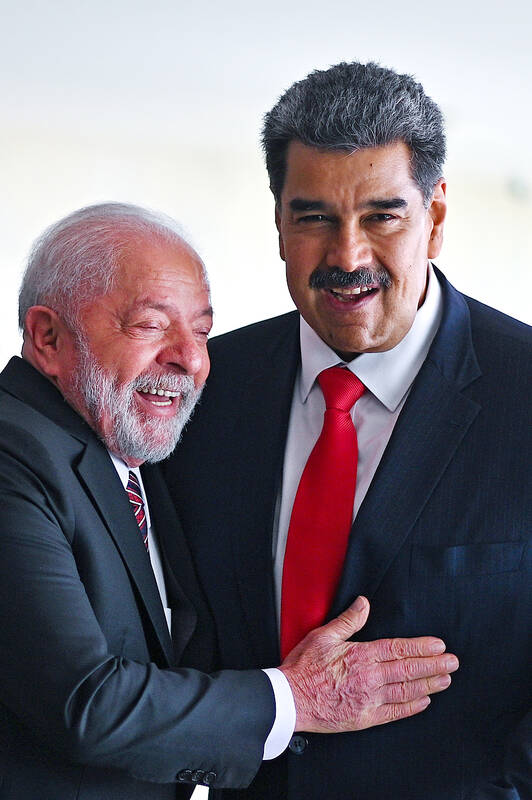Brazilian President Luiz Inacio Lula da Silva was yesterday scheduled to host fellow South American leaders for a “retreat” aimed at strengthening ties in a region where left-wing governments are newly back in style.
Eleven of the continent’s 12 heads of state are due to attend the summit in Brasilia — the first of its kind in nearly a decade — with only Peruvian President Dina Boluarte expected to miss it.
Veteran leftist Da Silva started things on Monday by meeting Venezuelan President Nicolas Maduro and hailing the “historic” restoration of a relationship that was severed under his predecessor, far-right former Brazilian president Jair Bolsonaro.

Photo: EPA-EFE
Brazil had cut diplomatic ties with Maduro’s government under Bolsonaro, who labeled the socialist leader a “dictator.”
“This is the start of Maduro’s return, and [yesterday’s] meeting will be the return of South American integration,” Da Silva told a news conference, after greeting his Venezuelan counterpart at the presidential palace with a hug and a back-slap.
Da Silva, who led Brazil from 2003 to 2010, is a self-declared fan of international cooperation and “regional integration,” which featured prominently in his first presidency, and is keen to reboot stalled South American ties.
This is the first summit of regional leaders since 2014 in Quito, Ecuador, at a gathering of the Union of South American Nations, a continental bloc launched in 2008 by Da Silva and late Venezuelan president Hugo Chavez.
That was the moment of Latin America’s so-called “pink tide,” when a wave of left-wing governments led the region.
Now, some political analysts are talking of a “new pink tide” in South America, with the recent election of Da Silva, Chilean President Gabriel Boric and Colombian President Gustavo Petro.
Da Silva wants to get the region cooperating again.
His government has touted projects such as a “Bi-Oceanic Corridor,” a transportation artery to enable countries to ship goods from one side of the continent to the other overland instead of by sea.
The summit would be a small, “more relaxed” gathering, with only the leaders, their foreign ministers and select advisers in the room, a Brazilian diplomatic source said.
“Groundbreaking visions” for South America’s future are unlikely to emerge from the summit, political scientist Oliver Stuenkel said.
However, “the meeting itself is good news,” he wrote in Americas Quarterly.
“Even a basic dialogue between heads of state is genuine progress after Brazil largely retreated from its neighborhood during the Bolsonaro years,” he said.
Since Da Silva defeated Bolsonaro in a divisive election to return to office in January, he has been overhauling Brazil’s foreign policy, vowing to seek friendly relations across the board and cultivating closer ties with partners as disparate as China and the US.
However, he has drawn attacks from opponents for being overly cozy with Russia, China and Latin American leftists such as Maduro and Nicaraguan President Daniel Ortega, who are accused of human rights violations.

By 2027, Denmark would relocate its foreign convicts to a prison in Kosovo under a 200-million-euro (US$228.6 million) agreement that has raised concerns among non-governmental organizations (NGOs) and residents, but which could serve as a model for the rest of the EU. The agreement, reached in 2022 and ratified by Kosovar lawmakers last year, provides for the reception of up to 300 foreign prisoners sentenced in Denmark. They must not have been convicted of terrorism or war crimes, or have a mental condition or terminal disease. Once their sentence is completed in Kosovan, they would be deported to their home country. In

Brazil, the world’s largest Roman Catholic country, saw its Catholic population decline further in 2022, while evangelical Christians and those with no religion continued to rise, census data released on Friday by the Brazilian Institute of Geography and Statistics (IBGE) showed. The census indicated that Brazil had 100.2 million Roman Catholics in 2022, accounting for 56.7 percent of the population, down from 65.1 percent or 105.4 million recorded in the 2010 census. Meanwhile, the share of evangelical Christians rose to 26.9 percent last year, up from 21.6 percent in 2010, adding 12 million followers to reach 47.4 million — the highest figure

LOST CONTACT: The mission carried payloads from Japan, the US and Taiwan’s National Central University, including a deep space radiation probe, ispace said Japanese company ispace said its uncrewed moon lander likely crashed onto the moon’s surface during its lunar touchdown attempt yesterday, marking another failure two years after its unsuccessful inaugural mission. Tokyo-based ispace had hoped to join US firms Intuitive Machines and Firefly Aerospace as companies that have accomplished commercial landings amid a global race for the moon, which includes state-run missions from China and India. A successful mission would have made ispace the first company outside the US to achieve a moon landing. Resilience, ispace’s second lunar lander, could not decelerate fast enough as it approached the moon, and the company has

‘THE RED LINE’: Colombian President Gustavo Petro promised a thorough probe into the attack on the senator, who had announced his presidential bid in March Colombian Senator Miguel Uribe Turbay, a possible candidate in the country’s presidential election next year, was shot and wounded at a campaign rally in Bogota on Saturday, authorities said. His conservative Democratic Center party released a statement calling it “an unacceptable act of violence.” The attack took place in a park in the Fontibon neighborhood when armed assailants shot him from behind, said the right-wing Democratic Center, which was the party of former Colombian president Alvaro Uribe. The men are not related. Images circulating on social media showed Uribe Turbay, 39, covered in blood being held by several people. The Santa Fe Foundation